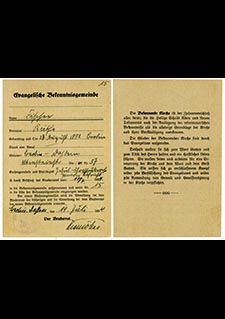Teacher and Member of the Confessing Church
Restless years of study and travel leading him to various schools followed for Georg Maus after his exam in 1921. From 1922 to 1925, he was in charge of a private school in Braunfels, which his wife Elisabeth, née Nies, whom he married in 1921, had run before him. Since he had neglected file the applications necessary for financial subsidies, he had to give up this job.
Afterward, he worked at the girls’ high school in Wetzlar from Easter until October of 1925, at the high school Betzdorf from Easter of 1928 for one year, then at the high school in Cologne-Mülheim again for one year until Easter of 1929, before he worked again in Wetzlar – this time for two years. From Easter of 1931 until October 1, 1931, he worked at the high school Düsseldorf-Benrath whither his family – three children had been born in the meantime – also moved in July.
He did not find a job in Koblenz for a brief period until two years later when he worked at Rethschule castle high school and subsequently Lessing high school in Düsseldorf from October of 1932 until Easter of 1933.
Maus was – and his basic conservative bent shows this quite clearly – a member of the German National People's Party until 1933. He became a member of the Nazi Teachers’ Association in 1933.
In Düsseldorf, Maus established contact with Hellmuth Lauffs, whose cousin was a pastor in Wuppertal whence he received the Confessing Church pastor’s sermons, which he usually discussed with Maus. They also extensively exchanged views on Rosenberg’s “Myth of the 20th Century” and spoke about fundamental theological issues such as Luther’s Doctrine of the Two Kingdoms. When the German Christians revealed their true character at the rally at the Sportpalast in Berlin in November of 1933, Georg Maus broke with National Socialism once and for all.
In 1934, Maus was one of the first in Düsseldorf-Benrath to undersign the Confessing Church’s “membership card” – the card pictured here is from Berlin-Dahlem and bears Martin Niemöller’s signature. Cards were also issued to parishioners there who wanted to back the Confessing Church.
For Maus, Holy Scripture constituted the key guiding principle crucial of his life and its study was essential – for instance, in Bible study or in discussion with likeminded individuals.

